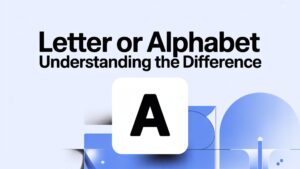When it comes to English spelling, even small variations can cause confusion. One such example is the word “connector” versus “connecter.” Which one is correct?
Are they interchangeable, or does one reflect outdated spelling? If you’ve ever found yourself wondering about the correct spelling, this article will settle the matter once and for all.
Understanding the Basics: Connector vs Connecter
Let’s begin with the most pressing question: “connector or connecter what’s the correct spelling?”
✅ Short Answer:
“Connector” is the preferred spelling in modern English especially in American English and technical contexts like USB, HDMI, and electrical components.
“Connecter” is considered a less common or outdated spelling. While it isn’t technically wrong, it’s rarely used today.
Connector Meaning: A Quick Definition
A connector is a device, person, or thing that links two or more items. This could be:
- A physical tool like a USB connector
- A bridge structure in engineering
- A word or phrase in grammar that joins clauses (also called connective words)
- A software application that integrates systems
In short, a connector helps to join two things together literally or figuratively.
Scenario Example: Email Using “Connector”
Subject: Missing HDMI Connector in Shipment
Hi Sandra,
I just received the shipment of display units, but the HDMI connector seems to be missing from the packaging. Can you please check if it was shipped separately?
Best regards,
Nathan
In this email, the word connector clearly refers to a physical connection tool a vital part of modern technology and data transfer.
The Origins: Word Formation and Etymology
Both connector and connecter come from the verb “connect.” But their endings follow different patterns in noun formation.
- “Connecter” was first recorded around the 15th century, during a time when Latin heavily influenced English spelling.
- The suffix -or became the standard for agent nouns (someone or something that does an action) in Standard English. That’s why we have actor, creator, editor, and, of course, connector.
📚 Word Origins & Historical Spellings
| Word | Root Verb | Suffix Used | Time Period | Common Today? |
|---|---|---|---|---|
| Connector | Connect | -or | Post 15th c. | ✅ Yes |
| Connecter | Connect | -er | 15th c. | ❌ No (Rare) |
Language evolution gradually favored the -or suffix for technical and agent-based nouns, pushing out earlier variants like “connecter.”
The Role of Style Guides and Dictionaries
Modern style guides and dictionaries (like Merriam-Webster, Oxford, and Cambridge) list “connector” as the primary spelling. Most don’t even list “connecter” as an alternative.
📖 What Dictionaries Say:
- Merriam-Webster: Recognizes connector, “connecter” redirects to the main spelling.
- Oxford English Dictionary: Lists connector; “connecter” marked as rare.
- Cambridge Dictionary: Only lists connector.
This shows that language consistency has settled the debate: connector is correct for modern language usage.
Grammar, Connectors, and Software
In grammar, a connector is a linking word or phrase also known as a conjunction or transitional device. For example:
- However,
- Therefore,
- Meanwhile,
- In contrast
These connective words help organize thoughts and build coherent writing.
Example: Grammar Connector in Use
Incorrect: She wanted to stay home. She went out.
Correct: She wanted to stay home, but she went out.
The word “but” acts as a grammatical connector, improving writing clarity and flow.
Similarly, in software applications, a connector may be a plug-in or interface that allows communication between systems—for example, connecting a CRM system to an email platform.
Usage in Context: Connecter vs Connector
Though “connecter” occasionally appears in niche or British English texts, its use is limited.
📨 Scenario Example: Old Engineering Report (Using “Connecter”)
The copper connecter was welded to the base plate to ensure a continuous flow of current through the circuit.
— Excerpt from a British engineering manual (circa 1952)
Even in older documents, spelling varied before modern writing standards were established. Today, this would be corrected to:
The copper connector was welded…
This reflects a shift toward language accuracy and spelling rules that promote standardization.
Common Domains Where “Connector” Is Used
| Field | Example Usage | Explanation |
|---|---|---|
| Technology | USB connector, HDMI connector | Enables data transfer and streaming |
| Engineering | Electrical plug connector | Connects wires or circuits in a wiring system |
| Transportation | Railway connector or interconnector | Joins carriages or transit systems |
| Linguistics | Connective words | Links clauses and improves flow in writing |
| Software | API connector | Connects applications and systems |
| Agriculture | Pipe connector in irrigation systems | Joins tubing or flow structures |
Why “Connecter” Is Outdated
While “connecter” follows older spelling variants based on verb-noun transformation (like “connect” + “-er”), it lost popularity due to inconsistency and redundancy with other nouns ending in “-or.”
Language consistency became a priority in the 20th century, particularly with the rise of technical writing and modern language education.
Figurative vs Literal Meaning of Connector
Let’s not forget that the word connector isn’t just used in technical contexts.
It’s also used figuratively, like:
- “Rachel is the connector in our friend group.”
- “Good writing uses connectors to guide the reader.”
Whether referring to a person, concept, or tool, the term retains its essence: creating a link or bridge.
Other Synonyms for Connector
If you’re looking to diversify your writing, here are some excellent synonyms for connector:
| Synonym | Use Case |
|---|---|
| Link | General use, simple writing |
| Joint | Engineering, carpentry |
| Coupler | Mechanics, railways |
| Adapter | Electrical and tech |
| Interface | Software systems |
| Attachment | Machinery, equipment |
| Joiner | General or figurative |
| Coupling | Pipes, cars, technical systems |
| Interconnector | High-voltage electricity or transport |
| Junction | Roads, tracks, or circuits |
Use these when you want to change tone, match context, or avoid repetition.
Email Example: Tech Terminology Using “Connector”
Subject: Faulty USB Connector
Hey Max,
Just a heads-up: the USB connector on the new docking stations isn’t securing properly. We’ve had three reports so far. I recommend we switch suppliers or add a better attachment mechanism.
Let me know what you think.
Cheers,
Ava
Spelling Rules: Why -or Beats -er
Let’s look at the broader pattern in English:
- Words ending in -or typically come from Latin or legal/technical usage: actor, professor, director, creator
- Words ending in -er tend to be Germanic or informal: worker, player, painter
Because “connector” is used frequently in legal, academic, and technical writing, it aligns with -or suffix preferences in those fields.
This is an important insight into how verb suffixes shape our word choice in English.
Grammatical Correctness and Language Accuracy
If you’re writing for:
- Academia
- Engineering
- Technology
- Professional documentation
…using “connector” ensures grammatical correctness and adheres to modern writing standards.
Correct Past Tense of Connect
Let’s clear up another related question:
What’s the past tense of “connect”?
It’s “connected.”
Don’t confuse it with the noun connector. Here’s an example:
Yesterday, we connected the pipes using a 90-degree connector.
Simple, right?
American vs British English Preference
Though there are a few differences in American vs British English spellings (like color vs colour, organize vs organise), connector is universally accepted in both dialects today.
The form connecter may appear in rare British texts, but it’s not standard.
Connector in Writing and Modern Usage
Modern writers, editors, and developers prefer connector for its clarity, consistency, and recognition.
From blog posts to academic papers to software APIs, connector has become the default spelling, fitting neatly into both literal and figurative expressions.
Final Verdict: Connector or Connecter Difference
Let’s sum it up in a simple table:
| Criteria | Connector | Connecter |
|---|---|---|
| Correct spelling? | ✅ Yes | ❌ No (outdated) |
| Used in grammar/software? | ✅ Yes | ❌ Rarely |
| Preferred spelling today? | ✅ Yes | ❌ No |
| Standard English? | ✅ Yes | ❌ No |
| Listed in style guides? | ✅ Yes | ❌ Rarely |
| Dictionaries? | ✅ Main Entry | ❌ Redirected |
Conclusion: Always Spell Connector with an -or
If you want to write with clarity, professionalism, and accuracy, stick with connector. Whether you’re referring to a USB device, a bridge, a linguistic transition, or a software interface, “connector” is the correct spelling in all cases.
The form connecter is outdated and no longer meets modern language expectations. When in doubt, consult dictionaries, style recommendations, and grammar rules they all point to the same thing.
So, next time you’re writing about a connection tool, a joint, or a software integration, remember: spell connector with an -or, and your writing will always be on point.








